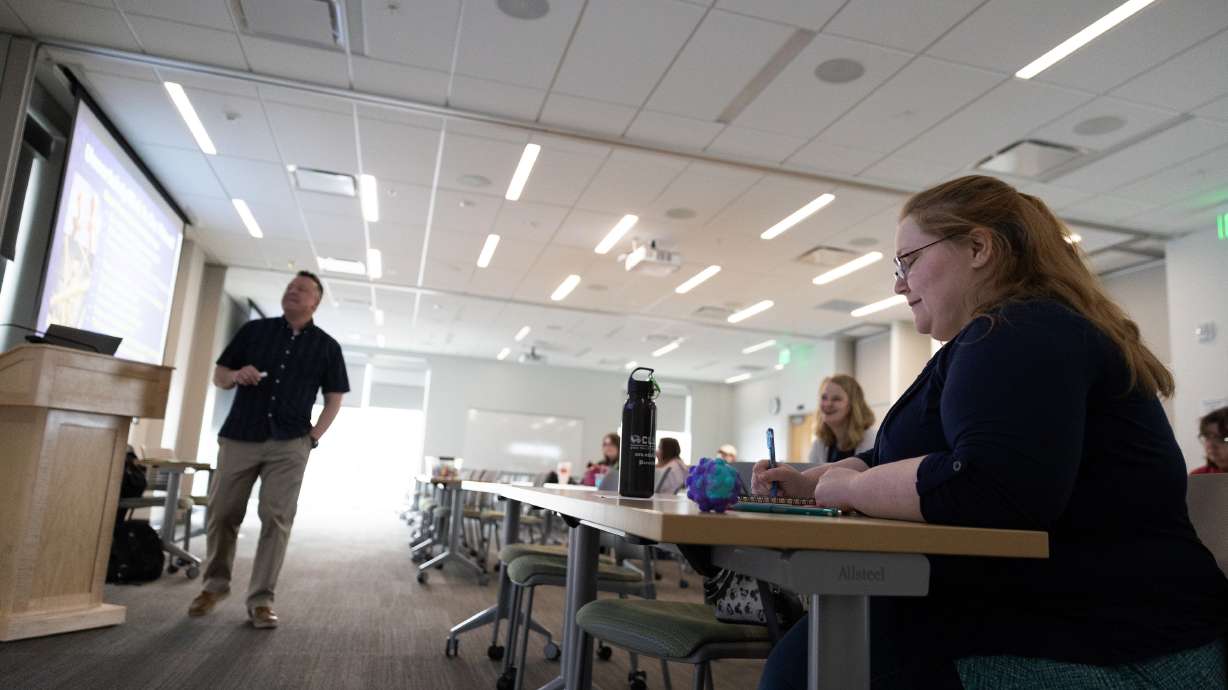Estimated read time: 5-6 minutes
This archived news story is available only for your personal, non-commercial use. Information in the story may be outdated or superseded by additional information. Reading or replaying the story in its archived form does not constitute a republication of the story.
SALT LAKE CITY — Public schools provide a variety of necessary services to children and teens with autism, but there is a lack of adequate support for adults who have aged out of the system, according to a new report.
The Utah Department of Health and Human Services, Utah Parent Center and the Utah State University Institute for Disability, Research, Policy and Practice recently partnered with the Madison House Autism Foundation and the Columbus Community Center on a pilot program to highlight the gaps in services for autistic adults and promote solutions.
Sumiko Martinez, director of the Autism After 21 Utah Project through the Madison House Autism Foundation, said the report focuses on the everyday obstacles adults with autism can face in the state.
"As you think through a regular day in your life, you get up, do your morning routine, maybe you drive to work, maybe you have a doctor appointment. But all of those different things can be places where neurodivergent individuals and people with autism can face additional barriers," she said.
"What we're trying to do is collect data from autistic individuals, from their family members and from community leaders, to be able to spot where the gaps are ... and then to be able to collaborate with local leaders, all the way up to state leadership, to help fill those gaps and make it so that people can participate in their communities as much as they want to," Martinez continued.
Rural-urban divide
Martinez said there are services for adults with autism in Utah, but most are clustered along the Wasatch Front, putting them out of reach for many people who live in the rural parts of the state.
A couple families interviewed for the report said they had to "split their household" — with one parent and a child living along the Wasatch Front for part of the week to access services.
"That's a crummy feeling, especially when you love where you live and don't necessarily want to move," Martinez said. "Just the sheer financial burden of that and the emotional toll of not being able to be with your family because there are, literally, not the support services. This has been a problem for a long time."
In some areas where there are mental health or other services, Martinez described a "constant churn" of providers, making it difficult for patients to develop long-lasting relationships.
One of the key recommendations she gave cities and towns is to work with professional associations and incentivize providers staying in rural areas.
Community and housing
The most common needs that survey respondents expressed were for housing, belonging and friendship. There's often a stigma that autistic people are less social, said Anna Smyth, a consultant who co-authored the report.
"This study showed us that that's just not true," she said. "It showed that people with autism — kids and adults — have social needs, they want to have friendships, they want to feel a sense of belonging, just like any other human does. We as a broader community need to think about how to meet that need in different ways."
When it comes to housing, Martinez said the state needs more neuroinclusive living space, which is built with sensory needs in mind. Some inclusive housing units have easily accessible tablets in common spaces, where residents can ask for help accessing different services and amenities.
Inclusive living can also mean locating sensory friendly amenities near one another, including fitness classes, health care facilities and other day-to-day needs. Reducing noise pollution or fluorescent lighting in areas can also be more accommodating, Smyth said.
There are an estimated 32,000 individuals with intellectual and developmental disabilities who live with caregivers who are over the age of 60, Martinez said, which puts them at risk if their caregiver becomes unable to take care of them.
"There aren't as many services as there need to be, so this crisis is really something that is building and building, but it's happening outside of the public view for the most part. It's really an invisible crisis in a lot of ways," she said.
Recommendations
In addition to the availability of services and inclusive spaces, advocates say general awareness and understanding can go a long way.
"A lot of people think autism is visible normally in children," said Whitney Lee, who organized the Neurodiverse Utah community on Facebook. "This leaves adults who don't fit what people have as a stereotype without access to services from anywhere from education to employment to health care."
Lee said government agencies — and police departments, in particular — should hire people who are trained to help people with autism.
But not all solutions are as cut and dry, so Smyth said the best thing policymakers and business leaders can do is be open to input from constituents and employees who have autism.
"They say, 'Well, tell us what to do,' and (they) want a very simple, clean answers to that question, where they can turn it into a to-do list and then check those things off the box," she said. "The reality of the autistic community is that it is varied. ... So, I think the real answer to that question, if there is one, is to start asking questions and listening deeply."
Correction: An earlier version misstated Sumiko Martinez's title. Martinez is the director of the Autism After 21 Utah Project through the Madison House Autism Foundation.










